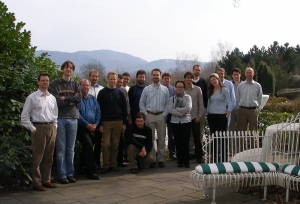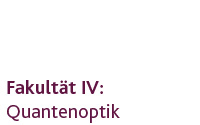Workshop Quantum Simulation and Control
About
 |
| Participants (click to enlarge) |
Among the topics of the workshop were:
- the creation and characterization of large entangled systems,
- characterisation of quantum phase transitions,
- transport of quantum information using spin systems,
- implementation of quantum simulations,
- control of quantum dynamics in different types of spin many-body systems,
- control of decoherence,
- implementation of robust and optimized quantum gates.
These and other topics were discussed from both a theoretical and experimental perspective with particular attention to the experimental systems that are investigated as part of the EU Integrated Project Qubit Applications [link]:
This workshop was meant as an informal meeting with a relatively small number of presentations, thus giving ample opportunity for exchange of ideas and in-depth discussions between the participants.
Programme
[link]
Presentations
- Chris Dawson (Imperial College London)
- An optimal control approach to the classical simulation of quantum many-body systems [Slides]
- Steffen Glaser (TU Munich)
- GRAPE, Robust Control and Quantum Gate Design Metric [Slides]
- Michael Hartmann (Imperial College London)
- Quantum Phase Transitions: Realization and Detection [Slides]
- Fedor Jelezko (Stuttgart University)
- Quantum Gates with NV Centres [Slides]
- Quantum phase transitions with NV diamonds [Slides]
- Strefan Kröll (Lund University)
- Quantum gates in rare-earth-ion doped crystals [Slides]
- Alexander Retzker (Imperial College London)
- Cooling Using Stark Shift Gate [Slides]
- Thomas Schulte-Herbrüggen (TU Munich)
- Quantum Compilation by Optimal Control: Results and Prospects for SP4 [Slides]
- Jason Twamley (Macquarie University Sydney)
- Global Quantum Computation: Error Correction and Fault Tolerance [Slides]
- Christof Wunderlich (Siegen University)
- Error Resistant Quantum Gates with Trapped Ions [Slides]
- Quantum phase transitions with NV diamonds [Slides]
- Mario Ziman (RCQI Bratislava)
- Quantum process tomography from incomplete data [Slides]
